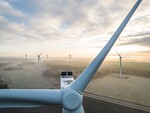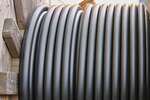05/07/2008
Germany - International Development in the Offshore Sector – key subject at HUSUM WindEnergy 2008
2008 and 2009 are expected to be boom years in the offshore sector in Europe – with planned commissioning of a total of 1507.5 MW on new installations coming online. The United Kingdom alone is likely to account for about 800 MW of this. Another milestone in offshore energy production will be the commercial launch of a number of wind turbines of the 5 MW class. The European Wind Energy Association (EWEA) predicts that, by the end of 2010, a cumulative offshore capacity of between 3000 and 4000 MW will be operational off the coasts of Europe. Offshore is therefore a central theme at the upcoming HUSUM WindEnergy 2008. This premier fair of the wind energy sector will be held in the Northern German coastal town of Husum from 9 to 13 September. A large number of international companies that develop or already commercially operate wind turbines specially developed for offshore application will exhibit their products, projects and specialised services in Husum. Presenting the latest technical and scientific offshore wind advancements is also a main theme at the HUSUM WindEnergy conference, which is an integral part of the fair.
The growth plans are promising – a European offshore goal of 40 000 MW by the year 2020 was announced at the European Offshore Wind Conference 2007 in Berlin. The United Kingdom alone aims at 33 000 MW by 2020. Germany wants 25 000 MW offshore wind power by 2030, sufficient to cover 15% of its energy demand. Other more moderate targets have been announced by the Netherlands (6000 MW by 2020) and Sweden (2500 to 3000 MW by 2015). However, there could be bottlenecks due to the scarcity of offshore wind turbines and the restricted number of suppliers.
Outside Europe, countries like the USA and China have announced plans to exploit their offshore wind potential. According to a study by the National Renewable Energy Laboratory (NREL), the offshore wind energy potential of the United States is more than 1 000 000 MW. By comparison, some 1100 MW offshore capacity was installed in Europe by the end of 2007, with Denmark and the UK the two main markets. Supply of offshore wind turbines is currently dominated by Vestas (with a market share of about 60%) and Siemens, both of them exhibitors at the HUSUM WindEnergy 2008. At the beginning of 2007, Vestas had to withdraw the V90-3 MW turbine from the market for technical reasons, but has released the machine for sale again from May 2008 onwards. At the beginning of March, the Dutch developer Evelop selected Vestas for supply of 110 turbines (V90-3 MW) for its Belgian 330 MW offshore project Belwind.
At the end of 2007 Siemens had offshore turbines in operation with a total capacity of 434 MW, and projects with more than 1080 MW in new portfolio projects. In 2007 the company for the first time installed 25 offshore turbines of the 3.6 MW category off the British coast, at the Burbo Banks wind farm. A UK project with 180 MW will be completed in 2008, and at least three more projects off the British and Danish coasts are planned for 2009, with a combined capacity of 400 MW.
Starting in 2008, a number of companies are joining the offshore competition for commercial use of 5 MW turbines. German companies REpower and Multibrid, also present in Husum, each developed a 5 MW turbine for offshore application. Each of these companies has been operating a prototype on shore since the end of 2004, and the turbines are now ready for series production. Rapid international expansion in this sector is expected following acquisition by the French nuclear group Arreva of 51% of Multibrid shares from the German project developer Prokon Nord in 2007. This year, a first batch of six Multibrid 5 MW turbines will be installed in the German offshore test field alpha ventus. REpower will install another six turbines of this category there in 2009.
REpower was the first company in the world to install 5 MW turbines in “real” offshore operation – two of these are installed off the Scottish coast, in a record water depth of 44 metres. Another 60 turbines are currently in the initial project phase, for C-Power’s 300 MW Farshore wind farm off the Belgian coast. A scaled-up 6 MW model will be launched in the next few years. A joint venture with rotor blade manufacturer A&R Rotec is to start in Bremerhaven in the near future, under the project name of PowerBlades, for production of 61.5 m offshore rotor blades developed by REpower. Other companies are likewise active in the offshore market. Converteam, for example, is a key partner in the Dutch 4.7 MW DarWinD offshore turbine project, supplying the direct drive generator.
Nordex of Germany is operating a 2.5 MW turbine in the port of Rostock, and will deliver another 21 units for Baltic I, Germany’s first commercial wind farm. This 52.5 MW project is scheduled to go on-line in 2009. Nordex decided to enter the offshore sector on a step-by-step basis, starting with the development of a new 3 to 5 MW turbine with “offshore features”. A prototype is to be built in 2010, and the 0 series by 2011/2. WinWinD of Finland has installed three of its 3 MW Multibrid type wind turbines on artificial islands in the Kemi Ajos wind farm close to the shore.
And finally, the Dutch company Blue H Technologies will provide information on its innovative “floating” offshore wind turbine technology at the HUSUM WindEnergy 2008. A prototype is currently being tested off the Italian coast. The next (pre) series model will feature a two-blade in-house modified 2.5 MW wind turbine.
HUSUM WindEnergy 2008 – the leading international wind industry fair – has for the first time been organised as a cooperation venture between the Messe Husum and the Hamburg Messe. From 9 to 13 September, some 700 exhibitors from 35 countries will present their products and services at the Husum trade fair site, including the world’s leading wind turbine manufacturers and their equipment suppliers. This fair is dedicated to the wind industry, and will be the international meeting point and forum for companies and trade visitors for five days. Further information is available at the website www.husumwindenergy.com
The growth plans are promising – a European offshore goal of 40 000 MW by the year 2020 was announced at the European Offshore Wind Conference 2007 in Berlin. The United Kingdom alone aims at 33 000 MW by 2020. Germany wants 25 000 MW offshore wind power by 2030, sufficient to cover 15% of its energy demand. Other more moderate targets have been announced by the Netherlands (6000 MW by 2020) and Sweden (2500 to 3000 MW by 2015). However, there could be bottlenecks due to the scarcity of offshore wind turbines and the restricted number of suppliers.
Outside Europe, countries like the USA and China have announced plans to exploit their offshore wind potential. According to a study by the National Renewable Energy Laboratory (NREL), the offshore wind energy potential of the United States is more than 1 000 000 MW. By comparison, some 1100 MW offshore capacity was installed in Europe by the end of 2007, with Denmark and the UK the two main markets. Supply of offshore wind turbines is currently dominated by Vestas (with a market share of about 60%) and Siemens, both of them exhibitors at the HUSUM WindEnergy 2008. At the beginning of 2007, Vestas had to withdraw the V90-3 MW turbine from the market for technical reasons, but has released the machine for sale again from May 2008 onwards. At the beginning of March, the Dutch developer Evelop selected Vestas for supply of 110 turbines (V90-3 MW) for its Belgian 330 MW offshore project Belwind.
At the end of 2007 Siemens had offshore turbines in operation with a total capacity of 434 MW, and projects with more than 1080 MW in new portfolio projects. In 2007 the company for the first time installed 25 offshore turbines of the 3.6 MW category off the British coast, at the Burbo Banks wind farm. A UK project with 180 MW will be completed in 2008, and at least three more projects off the British and Danish coasts are planned for 2009, with a combined capacity of 400 MW.
Starting in 2008, a number of companies are joining the offshore competition for commercial use of 5 MW turbines. German companies REpower and Multibrid, also present in Husum, each developed a 5 MW turbine for offshore application. Each of these companies has been operating a prototype on shore since the end of 2004, and the turbines are now ready for series production. Rapid international expansion in this sector is expected following acquisition by the French nuclear group Arreva of 51% of Multibrid shares from the German project developer Prokon Nord in 2007. This year, a first batch of six Multibrid 5 MW turbines will be installed in the German offshore test field alpha ventus. REpower will install another six turbines of this category there in 2009.
REpower was the first company in the world to install 5 MW turbines in “real” offshore operation – two of these are installed off the Scottish coast, in a record water depth of 44 metres. Another 60 turbines are currently in the initial project phase, for C-Power’s 300 MW Farshore wind farm off the Belgian coast. A scaled-up 6 MW model will be launched in the next few years. A joint venture with rotor blade manufacturer A&R Rotec is to start in Bremerhaven in the near future, under the project name of PowerBlades, for production of 61.5 m offshore rotor blades developed by REpower. Other companies are likewise active in the offshore market. Converteam, for example, is a key partner in the Dutch 4.7 MW DarWinD offshore turbine project, supplying the direct drive generator.
Nordex of Germany is operating a 2.5 MW turbine in the port of Rostock, and will deliver another 21 units for Baltic I, Germany’s first commercial wind farm. This 52.5 MW project is scheduled to go on-line in 2009. Nordex decided to enter the offshore sector on a step-by-step basis, starting with the development of a new 3 to 5 MW turbine with “offshore features”. A prototype is to be built in 2010, and the 0 series by 2011/2. WinWinD of Finland has installed three of its 3 MW Multibrid type wind turbines on artificial islands in the Kemi Ajos wind farm close to the shore.
And finally, the Dutch company Blue H Technologies will provide information on its innovative “floating” offshore wind turbine technology at the HUSUM WindEnergy 2008. A prototype is currently being tested off the Italian coast. The next (pre) series model will feature a two-blade in-house modified 2.5 MW wind turbine.
HUSUM WindEnergy 2008 – the leading international wind industry fair – has for the first time been organised as a cooperation venture between the Messe Husum and the Hamburg Messe. From 9 to 13 September, some 700 exhibitors from 35 countries will present their products and services at the Husum trade fair site, including the world’s leading wind turbine manufacturers and their equipment suppliers. This fair is dedicated to the wind industry, and will be the international meeting point and forum for companies and trade visitors for five days. Further information is available at the website www.husumwindenergy.com
- Source:
- HUSUM WindEnergy 2008
- Author:
- Edited by Trevor Sievert, Online Editorial Journalist / Author: Staff
- Email:
- gudrun.blickle@hamburg-messe.de
- Link:
- www.husumwindenergy.com/...
- Keywords:
- HUSUM WindEnergy 2008, wind energy, wind farm, renewable energy, wind power, wind turbine, rotorblade, offshore, onshore



























